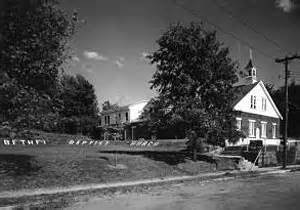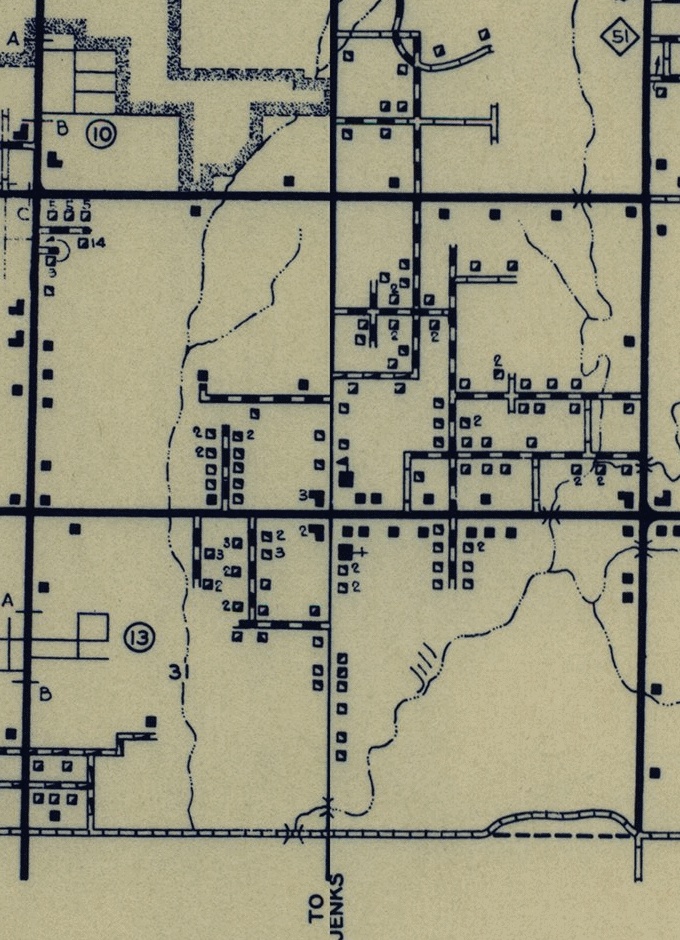Tulsa History: January 2015 Archives
If you've driven down Lewis Avenue between 51st and 61st Street in the last week, you might have been as surprised as I was to see a church in that part of town advertising its 100th anniversary. Southern Hills Baptist Church doesn't look a day over 60, and indeed it was in 1955 that the church moved to its current location, about the time that US 66 was rerouted to Skelly Drive just north of 51st and Tulsa's southward suburban spread reached this area. The church's history is a reminder of the rural communities -- shops, churches, and homes clustered around a rural schoolhouse, acting as a nucleus for a farming community -- that were absorbed by the expanding city and in some cases erased from the map.
According to the Southern Hills Baptist Church website:
Southern Hills Baptist Church was founded January 17, 1915 as Bethel Baptist Church following a meeting of the delegates of First Baptist Church of Tulsa, OK who were led by Pastor L. E. Floyd. The meeting was held at the Bethel Union School House located at 51st and Lewis Ave. At the first meeting, articles of faith and a church covenant were adopted along with the times of meeting being the first and third Sundays of each month. The Reverend James T. Brattin of Barry Co., Mo. was elected moderator and George Lane of Tulsa, appointed church clerk. Following the meeting the 21 area families were presented as founding membership.The church continued to meet at Bethel Union School House until 1924 when the congregation voted to purchase 2 ½ acres of land on the southeast corner of 51st and Lewis Ave. A brown brick two story building was constructed that would serve as the place of worship for the members of Bethel Baptist Church for the next 32 years. The church survived tough times during the depression of the 1930's and the 2nd World War. During this period, pastors were hard to find and keep.
Between 1942 and 1952, many changes occurred. There was a mortgage burning in 1944; installation of the first organ in 1947; a parsonage was built on the property in 1950; the first church bus purchased in 1950; the first library started in 1952; and later, in December, 1954, due to a changing world, the first locks were installed on the church building.
The first mention of a possible move to a new location was made in January, 1952 and a committee was appointed to seek a location. A five acre parcel of land at 56th and Lewis Avenue, just a half mile south, was purchased in 1955 for a new building and the name was changed on May 1, 1955 from Bethel Baptist Church to Southern Hills Baptist Church. June 8, 1955 began a period of worship in the "Canvas Cathedral" as the church purchased a 50' x 80' tent for use during the transitional period. The old Bethel Baptist Church site was sold in November 1955 to George Fikes of Fikes Food Stores. Ground breaking for a new sanctuary and educational space at 56th and Lewis took place on April 15, 1956.
A web search turned up a cached photo of Bethel Baptist Church at its old location. From the terrain and shadows, I'm guessing that it faced Lewis and sat some distance south of 51st.

The history above mentions Bethel Union School as the site of the church's founding. The school sat on the northeast corner of 51st and Lewis.
The first newspaper reference I can find to Bethel Union school is on September 14, 1906, in the first anniversary edition of the Tulsa Daily World. The school had hosted a meeting of the Indian Territory Republican committee. The paper called the group "the voice of the farmer" and said that "Republicanism is much in evidence in that part of the country." (The same front page celebrates the awarding of the first street railway franchise in Tulsa to Charles H. Bosler of Dayton with construction of between four to six miles of track for $50,000 to $75,000.
The "remodeled and enlarged" Bethel Union school was dedicated on September 6, 1914. It had been a one-room schoolhouse, but the "public spirited [school board] members" decided to make it a graded school, adding a second room and constructing it so that the two rooms could be joined to serve as an auditorium and host church services on Sundays.
A July 26, 1916, news story reports that the Bethel Union schoolhouse had been damaged by the explosion of a truck carrying nitroglycerin, and the board voted to build a new brick structure to replace the damaged building.
News stories frequently mention the school as the site of agricultural meetings, for example, this "Farmers' Day" meetings hosted by J. P. Harter, the Tulsa County government farmer at Bethel Union and Alsuma schools on December 13, 1912. On July 12, 1913, the school hosted a series of speakers urging good roads for Tulsa County, including Judge L. M. Poe, who was to speak on "good roads without bond issues."
An inset of the 1937 state highway department map of Tulsa County shows Lewis as a paved road leading to Jenks, and, around 51st and Lewis, five businesses, a school (Bethel Union), a church (Bethel Baptist), and numerous gravel and dirt side roads lined with homes. Note that Joe Creek, cutting diagonally from near 51st and Harvard to near 61st and Lewis, was then labeled Jill Creek.

OKGenWeb has photos of Bethel Union school's front door in May 1940 and the school bus in front of the building. That site states that the brick building that was later Paul Revere School was built in 1922.
Many years later -- perhaps after consolidation with the Tulsa school district -- Bethel Union School became known as Paul Revere Elementary School. A blogger recalls walking north on Atlanta Place to Paul Revere School and encountering hundreds of monarch butterflies one autumn morning.
My 3rd Grade Little League team played (and almost beat!) Revere's team in the spring of 1972, but because they had no green space big enough for a baseball diamond, we played the game at (if I recall correctly) Heller Park.
Paul Revere School had been spared demolition in the 1950s -- it was wedged between Skelly Bypass (I-44) and 51st Street, and the bypass swerved north as it cut through the hill to pass under Lewis Ave. The building was demolished in the 1980s to make way for Western National Bank's tower, which in turn fell to I-44 widening a few years ago.
There are few traces of the existence of the Bethel Union community. Some of the streets -- Columbia Pl., 49th St., 47th St., line up with the 1937 map -- and you may find a few homes along those streets that look to be from that era, old farmhouses that survived the subdivision of their pastures and fields. Similar road patterns can be seen around 11th and Memorial, 11th and 129th East Ave., 11th and Lynn Lane Rd., 61st and Mingo, to name a few that come to mind.
(UPDATED 2021/06/21 to fix OkGenWeb links to new okgenweb.net domain.)